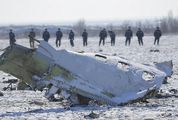BOOK: When Breath Becomes Air
by By Lucy Kellaway,
2016-02-12 11:54:41.0
ALL HIS short adult life, Paul Kalanithi was an expert on suffering and death. As an undergraduate studying literature, he knew his Greek tragedies, his King Lear, his Nabokov, Eliot and Beckett. Later, feeling the need to be closer to his subject, he followed his father and brother into medicine, partly to "pursue death: to grasp it, uncloak it, and see it eye-to-eye, unblinking".
At 36, he got a more intimate view still when he was diagnosed with terminal lung cancer. "Death, so familiar to me in my work, was now paying a personal visit," he observes. Only this time it turned out not to be familiar at all. He was faced by "a blank, a harsh, vacant, gleaming white desert".
Kalanithi died last March and his unfinished memoir, When Breath Becomes Air, is two popular and new literary genres rolled into one. It is the doctor-turned-author reporting from the front lines of medicine (perfected by Atul Gawande, Henry Marsh and Siddhartha Mukherjee), and also the cancer memoir by an individual facing his or her own death (as written by Oliver Sachs, Christopher Hitchens, John Diamond and many others).
The combination has turned out to be a commercial sensation. In the US, the slim, intelligent volume swiftly reached number one on Amazon, proving that dying, if packaged alluringly enough, can now outsell cooking, tidying and the adult colouring books that otherwise fill the top 10.
Yet anyone buying this book expecting a mawkish weepie will be disappointed. It turns out not really to be about dying at all but about life and how to live it — though the closeness of death gives it an urgency and economy: by the end, Kalanithi’s hands were so sore that he wore seamless gloves to type. Even his final paragraph — a plea to his eight-month-old daughter to remember, when she comes to consider how worthwhile her own life has been, the joy she gave her dying father — left me dry-eyed.
As did the fact that this brilliant young man, a scientist with a love of words and of a deep human understanding, failed to attend his own graduation and fulfil his promise to become one of America’s finest neurosurgeons, because he had collapsed and was vomiting bile.
Kalanithi steadfastly refuses the cheap trick of pulling on heartstrings, preferring to engage with his reader’s brain instead. It is as though we were in scrubs, and invited to slice through his skull and inspect the extraordinary organ it contained.
When Breath Becomes Air is a Renaissance book from a Renaissance man. It is a work of philosophy and morality, a reconciliation of science and religion. There is even plot and excitement — at one point I felt I was back watching ER on TV, with the ambulance crews running along corridors shouting vital statistics of patients — the only difference being that Kalanithi has TS Eliot looking over his shoulder as he calls for CT scans.
Above all, it is about what it is to be a neurosurgeon working in the "crucible of identity", doing what he says is one of the worst jobs there is. The hours and the pressure and the guilt are such that one colleague who makes a mistake subsequently kills himself. Others shift to easier jobs. Kalanithi himself finds at one point all compassion drummed out of him. One day, as an exhausted young doctor, he puts down an ice cream to treat a patient who promptly dies — after which he returns to his melting ice cream.
But in the end being a neurosurgeon is not a job — it is a calling. Which is why Kalanithi, wracked with pain in his own spine and with months to live, still finds himself standing for hours operating on the damaged spine of another.
When he is diagnosed with terminal cancer, there are no clichés about living in the moment (which is wretched due to the pain and the fact that everything tastes like salt). Instead he explains how he went through the famous cycle — only in reverse, starting with acceptance and ending in denial. He tells us how statistics — the medical profession’s mainstay — change their meaning when you become one. "The angst of facing mortality has no remedy in probability."
Even the syntax of existence is turned on its head: you are no longer the subject of every sentence, you are the object. It was only with the restrained, elegant epilogue written by his wife, Lucy Kalanithi, that I found myself weeping helplessly. He never quite tells us what death means, possibly because he was still alive when writing. Yet his wife’s account leaves one in no doubt: death means visiting the grave of the man you love and pouring Madeira — which they drank on honeymoon — into the ground.
She also shows us a different side of the intense, serious person who has written this book. When he was diagnosed, he e-mailed a friend: "The good news is I’ve already outlived two Brontës, Keats and Stephen Crane. The bad news is that I haven’t written anything."
In the last 22 months of his life, Paul Kalanithi put that right. When Breath Becomes Air tells us what means to live a good life, by giving us a glimpse into an exceptional one.
DETAILS
TITLE: WHEN BREATH BECOMES AIR
AUTHOR: PAUL KALANITHI
PUBLISHER: BODLEY HEAD/ RANDOM HOUSE
• Lucy Kellaway is an FT columnist
The Financial Times Limited 2016

Picture: THINKSTOCK
ALL HIS short adult life, Paul Kalanithi was an expert on suffering and death. As an undergraduate studying literature, he knew his Greek tragedies, his King Lear, his Nabokov, Eliot and Beckett. Later, feeling the need to be closer to his subject, he followed his father and brother into medicine, partly to "pursue death: to grasp it, uncloak it, and see it eye-to-eye, unblinking".
At 36, he got a more intimate view still when he was diagnosed with terminal lung cancer. "Death, so familiar to me in my work, was now paying a personal visit," he observes. Only this time it turned out not to be familiar at all. He was faced by "a blank, a harsh, vacant, gleaming white desert".
Kalanithi died last March and his unfinished memoir, When Breath Becomes Air, is two popular and new literary genres rolled into one. It is the doctor-turned-author reporting from the front lines of medicine (perfected by Atul Gawande, Henry Marsh and Siddhartha Mukherjee), and also the cancer memoir by an individual facing his or her own death (as written by Oliver Sachs, Christopher Hitchens, John Diamond and many others).
The combination has turned out to be a commercial sensation. In the US, the slim, intelligent volume swiftly reached number one on Amazon, proving that dying, if packaged alluringly enough, can now outsell cooking, tidying and the adult colouring books that otherwise fill the top 10.
Yet anyone buying this book expecting a mawkish weepie will be disappointed. It turns out not really to be about dying at all but about life and how to live it — though the closeness of death gives it an urgency and economy: by the end, Kalanithi’s hands were so sore that he wore seamless gloves to type. Even his final paragraph — a plea to his eight-month-old daughter to remember, when she comes to consider how worthwhile her own life has been, the joy she gave her dying father — left me dry-eyed.
As did the fact that this brilliant young man, a scientist with a love of words and of a deep human understanding, failed to attend his own graduation and fulfil his promise to become one of America’s finest neurosurgeons, because he had collapsed and was vomiting bile.
Kalanithi steadfastly refuses the cheap trick of pulling on heartstrings, preferring to engage with his reader’s brain instead. It is as though we were in scrubs, and invited to slice through his skull and inspect the extraordinary organ it contained.
When Breath Becomes Air is a Renaissance book from a Renaissance man. It is a work of philosophy and morality, a reconciliation of science and religion. There is even plot and excitement — at one point I felt I was back watching ER on TV, with the ambulance crews running along corridors shouting vital statistics of patients — the only difference being that Kalanithi has TS Eliot looking over his shoulder as he calls for CT scans.
Above all, it is about what it is to be a neurosurgeon working in the "crucible of identity", doing what he says is one of the worst jobs there is. The hours and the pressure and the guilt are such that one colleague who makes a mistake subsequently kills himself. Others shift to easier jobs. Kalanithi himself finds at one point all compassion drummed out of him. One day, as an exhausted young doctor, he puts down an ice cream to treat a patient who promptly dies — after which he returns to his melting ice cream.
But in the end being a neurosurgeon is not a job — it is a calling. Which is why Kalanithi, wracked with pain in his own spine and with months to live, still finds himself standing for hours operating on the damaged spine of another.
When he is diagnosed with terminal cancer, there are no clichés about living in the moment (which is wretched due to the pain and the fact that everything tastes like salt). Instead he explains how he went through the famous cycle — only in reverse, starting with acceptance and ending in denial. He tells us how statistics — the medical profession’s mainstay — change their meaning when you become one. "The angst of facing mortality has no remedy in probability."
Even the syntax of existence is turned on its head: you are no longer the subject of every sentence, you are the object. It was only with the restrained, elegant epilogue written by his wife, Lucy Kalanithi, that I found myself weeping helplessly. He never quite tells us what death means, possibly because he was still alive when writing. Yet his wife’s account leaves one in no doubt: death means visiting the grave of the man you love and pouring Madeira — which they drank on honeymoon — into the ground.
She also shows us a different side of the intense, serious person who has written this book. When he was diagnosed, he e-mailed a friend: "The good news is I’ve already outlived two Brontës, Keats and Stephen Crane. The bad news is that I haven’t written anything."
In the last 22 months of his life, Paul Kalanithi put that right. When Breath Becomes Air tells us what means to live a good life, by giving us a glimpse into an exceptional one.
DETAILS
TITLE: WHEN BREATH BECOMES AIR
AUTHOR: PAUL KALANITHI
PUBLISHER: BODLEY HEAD/ RANDOM HOUSE
• Lucy Kellaway is an FT columnist
The Financial Times Limited 2016




















Change: 1.19%
Change: 1.36%
Change: 2.19%
Change: 1.49%
Change: -0.77%
Data supplied by Profile Data
Change: -0.19%
Change: 0.69%
Change: 1.19%
Change: 0.00%
Change: 0.44%
Data supplied by Profile Data
Change: 0.62%
Change: 0.61%
Change: 0.23%
Change: 0.52%
Change: 0.12%
Data supplied by Profile Data
Change: -0.21%
Change: -1.22%
Change: -0.69%
Change: -0.51%
Change: 0.07%
Data supplied by Profile Data